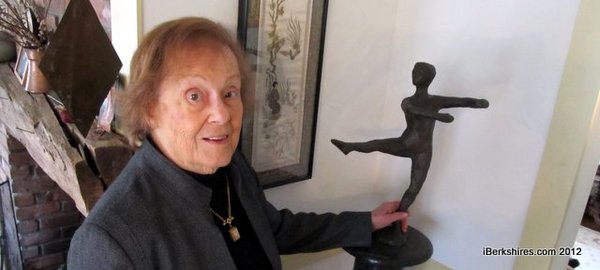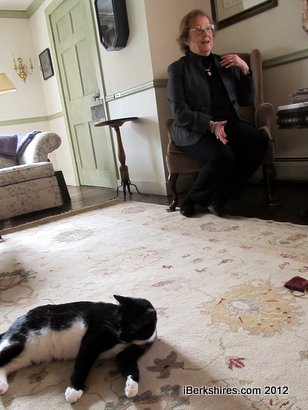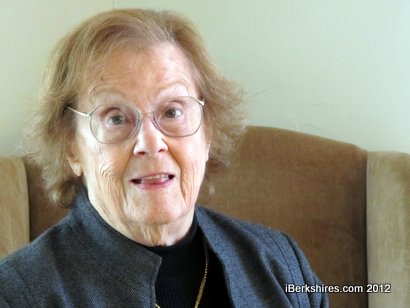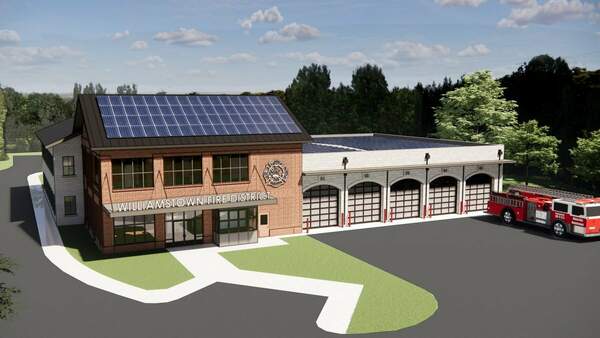
Williamstown Woman Recalls Kindertransport Rescue
 Edith Evans and her late husband bought their home in Williamstown in the 1980s. |
She was among the thousands of Jewish children rescued from Nazi Germany and the occupied countries and sent to England through a humanitarian operation called "Kindertransport" (child transport). According to the Kindertransport Association, the first train carrying the refugee children left on Dec. 1, 1938, and the last left on Sept. 1, 1939, two days before Great Britain declared war on Germany. Some 10,000 children were saved.
Now in her home in Williamstown, octogenarian Edith Zwick Evans recalled how life had changed in her homeland of Austria after it had been annexed by Germany in 1938.
"It happened fast in Vienna," said Evans. "And on Nov. 10, (1938) the Jewish people came under full attack. They (Nazi authorities and storm troopers) arrested most of the men, and came into houses and took whatever they wanted."
That violent event was known as Kristallnacht — the night of broken glass — as the destruction involved windows of synagogues, Jewish shops and homes being smashed.
"Generally, everyone desperately looked for countries which might allow them to immigrate. There was an active rumor mill about which country took in refugees — Cuba, Mauritania, Brazil, ... ," Evans said. "It was important to get all kinds of documents together to be ready to go at a moment's notice. I remember standing in lines at various consulates, police stations, etc., to get what I needed."
The youngest of four children, Evans was the third to leave Austria. Her brother and one of her sisters had emigrated to the United States earlier, and her mentally challenged sister would remain in Austria, living with her mother.
Evans' father was sent to a concentration camp, but at that time "you could get out if you were able to get a visa to leave the country," Evans said. "My uncle in England arranged for my father to get a visa, and he came home so he could see me off at the railroad station."
But her mother didn't get to her in time to say goodbye and they would never be reunited. Although Evans does not know exactly what happened to her mother and sister under the Nazi regime, she believes they were sent to one of the concentration camps set up in Poland.
When she embarked on her journey to England, she was allowed to bring only one suitcase. "I did not have anything of sentimental value to take with me. They had robbed everything, including a little ring I liked," Evans said, referring ransacking of her family's home during Kristallnacht.
Though Evans has no tangible mementos of the happy days of her youth in then peaceful Vienna, she remembers that every Sunday afternoon all the family visited her maternal grandmother.
"The daughters and daughters-in-law — my mother was the oldest of eight children — brought cakes and cookies and there was a subtle competition as to whose was the best," Evans said. "The cousins ... would spend the afternoon playing in my grandmother's spacious apartment."
At home, the Zwicks, who were considered conservative as far as Judaism, Evans said, celebrated Friday nights with lighting of candles and a festive meal. "Friday morning, the house was always fragrant with the scent of fresh baked bread and coffee cake."
Another of Evans' fond memories is of the family vacationing every summer in the Austrian mountains or at the Italian seashore, her father joining them when he could.
She does remember the clickety-clack sound of the train stopped at the border between Germany and Denmark, where kindness and reassurance were bestowed on the young refugees. "Ladies gave us oranges. It was a symbol of safety," said Evans.
 |
"She was very damaged," said Evans, adding that the woman was unable to speak and hard to look at. "We communicated by sign language. I liked her and felt I had to help with her care," she continued, but was often at a loss when the woman became frustrated and threw tantrums. They parted on friendly terms when she returned to the hostel.
"They paid for me to go to a commercial school," said Evans, who had gone as far as seventh grade in Vienna. She learned to speak English in the hostel, and with her foster family, and at commercial school. "At commercial school, I learned to earn a living and not depend on other people."
Her father arrived in England in August 1939, intending to make it possible for his wife and other daughter to join him.
"That never happened as war broke out in September. Ironically, my father was sent to an internment camp as an enemy alien," Evans said. He was a free man, however, when he succumbed to cancer in a nursing home at the age of 52.
When Evans was about 16, she found work in London and lived independently. A couple of years later, she emigrated to the United States, looking forward to being with her brother and sister.
"I started life anew," said Evans, these many years later. "Since my brother was very well educated and smart, he tutored me and I took the high school completion exam and passed that." Next, she fulfilled her wish to go to college, and went on to graduate school at Columbia University in New York City.
"I always worked in child guidance," she said adding that her past had some influence on her career choice. "I knew what it was to be a displaced child and I wanted to help."
She married, had three children and lived in Connecticut, where she developed a talent for sculpting. In later years, she and her husband bought and operated the Sedgewick Inn in Berlin, N.Y.
 "We bought a house in Williamstown in the mid-1980s," Evans said. "We had always liked the town, and knew we would need to get away from the inn [from time to time]."
"We bought a house in Williamstown in the mid-1980s," Evans said. "We had always liked the town, and knew we would need to get away from the inn [from time to time]."Evans' husband died in 1991, but she continued operating the inn until selling it in 1999 and becoming a full-time Williamstown resident.
Evidence of her talent for turning big and small pieces of wood and stone into beautiful sculptures can be seen throughout her home. Gesturing to one in the living room, she said with a smile, "I call it the 'Pilgrim Girl.' It is my first work, and when I started it, I meant for it to be an owl."
Besides sculpting, Evans enjoys the cultural attractions the Berkshires offers. She visits the Clark Art Institute and attends Williams College events. One evening in April, a concert at Brooks-Rogers Recital Hall evoked warm memories.
"They had a concert of German lieder (poetic songs) sung by Professor Kibler," Evans said. "I have heard him before and it is always a sentimental experience since my brother sang and Schubert's lieder was among his favorites."
But while the child who left Austria wondering what the future held grew into a confident woman who seems happy living in the present, that last, missed moment with her mother nearly 75 years ago weighs on her.
"That unfinished goodbye makes all my important goodbyes hard," said Evans.

 WILLIAMSTOWN, Mass. — The Prudential Committee on Wednesday signed off on more than $1 million in cost cutting measures for the planned Main Street fire station.
WILLIAMSTOWN, Mass. — The Prudential Committee on Wednesday signed off on more than $1 million in cost cutting measures for the planned Main Street fire station.













